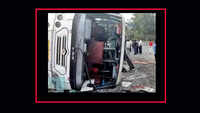
HYDERABAD: In what could be alarming students, the number of seats in degree courses may drop by almost 30% in the forthcoming academic year as several colleges have been found deficient in terms of facilities and faculty during inspections conducted between February and March by university authorities.

After a gap of three years, OU, Kakatiya University and Satavahana University conducted inspections to verify sanctioned intake, teacher availability, infrastructure, among others.
There were some colleges, which did not adhere to fire safety norms and lacked facilities like classrooms and laboratories. Some of the colleges were functioning out of premises with expired lease. “There were 13 colleges where the managements were running intermediate and degree courses out of the same premises. As per the Telangana State Council of Higher Education (TSCHE) norms, there should be separate premises and entry and exit for the two colleges,” explained Rao.
While a notification for admissions into degree courses is expected to release on May 9 with the admission process expected to commence from May 10, the universities have warned college managements that if they failed to adhere to the guidelines, they would not be part of Degree Online Services Telangana (DOST).
Colleges failing to cover the inadequacies would also face disaffiliation for the academic year 2019-20, they pointed out. This is the first time that the TSCHE has decided to crack the whip on errant colleges.
Colleges question ‘arm twisting’
Managements have questioned TSCHE’s ‘arm-twisting’ methods to keep erring colleges out of DOST. “We have not been told about TSCHE guidelines or parameters,” said Laxma Reddy, president, Association for Strengthening of Private Initiative in Rural Education. “If colleges are not allowed to be part of DOST over failure to fulfil minor parameters, it will result in a huge drop in the number of seats. It will affect students, especially from the rural areas.”
Giving in to the demands by private degree colleges, the TSCHE has in-principle agreed to introduce management quota seats in degree courses. However, a final decision in this regard will be taken after consulting Telangana education minister G Jagadish Reddy.

Inspection committees found that of the 432 colleges checked under Osmania University (OU) jurisdiction, 15% colleges did not have regular principals and subject-wise faculty staff. “Many colleges appointed a senior teacher as in-charge principal, and they were found functioning without sufficient number of subject-wise teachers,” said C Venugopal Rao, director, academic audit cell, OU. “We issued letters to all such colleges specifying the deficiencies, and asked them to fulfil them within 20 days of inspections.”
After a gap of three years, OU, Kakatiya University and Satavahana University conducted inspections to verify sanctioned intake, teacher availability, infrastructure, among others.
There were some colleges, which did not adhere to fire safety norms and lacked facilities like classrooms and laboratories. Some of the colleges were functioning out of premises with expired lease. “There were 13 colleges where the managements were running intermediate and degree courses out of the same premises. As per the Telangana State Council of Higher Education (TSCHE) norms, there should be separate premises and entry and exit for the two colleges,” explained Rao.
While a notification for admissions into degree courses is expected to release on May 9 with the admission process expected to commence from May 10, the universities have warned college managements that if they failed to adhere to the guidelines, they would not be part of Degree Online Services Telangana (DOST).
Colleges failing to cover the inadequacies would also face disaffiliation for the academic year 2019-20, they pointed out. This is the first time that the TSCHE has decided to crack the whip on errant colleges.
Colleges question ‘arm twisting’
Managements have questioned TSCHE’s ‘arm-twisting’ methods to keep erring colleges out of DOST. “We have not been told about TSCHE guidelines or parameters,” said Laxma Reddy, president, Association for Strengthening of Private Initiative in Rural Education. “If colleges are not allowed to be part of DOST over failure to fulfil minor parameters, it will result in a huge drop in the number of seats. It will affect students, especially from the rural areas.”
Giving in to the demands by private degree colleges, the TSCHE has in-principle agreed to introduce management quota seats in degree courses. However, a final decision in this regard will be taken after consulting Telangana education minister G Jagadish Reddy.
#ElectionsWithTimes
more from times of india cities
Quick Links
Lok Sabha Election Schedule 2019Lok Sabha Election NewsDelhi Capitals teamMI team 2019Rajasthan Royals 2019RCB team 2019Maharashtra Lok Sabha ConstituenciesBJP Candidate ListBJP List 2019 TamilnaduShiv Sena List 2019AP BJP List 2019Mamata BanerjeeBJP List 2019 MaharashtraPriyanka GandhiBJP List 2019 KarnatakaAMMK Candidate List 2019BJP List 2019 WBLok Sabha Elections in Tamil NaduBSP List 2019 UPNews in TamilLok Sabha Poll 2019Satta Matka 2018PM ModiMahagathbandhanNagpur BJP Candidate ListChandrababu NaiduTamil Nadu ElectionsUrmila MatondkarNews in TeluguMadras High CourtTejashwi YadavArvind KejriwalTejasvi SuryaPawan KalyanArvind KejriwalYogi AdityanathJaya PradaSatta King 2019Srinagar encounter
Get the app











